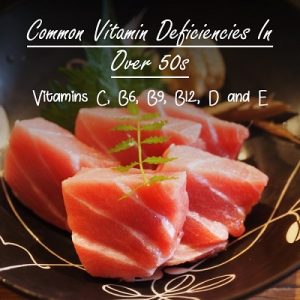 Vitamin deficiencies are common at all ages, but some are more common at specific ages. This is because our diets, lifestyles, and health in general are radically different through every decade of our lives, putting us at risk of different deficiencies.
Vitamin deficiencies are common at all ages, but some are more common at specific ages. This is because our diets, lifestyles, and health in general are radically different through every decade of our lives, putting us at risk of different deficiencies.
Something many of us are aware of is that over the age of fifty most deficiencies are rather common. This is because of a change in how we eat, digest, and use vitamins.
As we grow older we are prone to putting on weight due to our metabolism slowing down, so we will often reduce how much food we are eating.
This can become a problem if we do not increase the nutritional quality of our foods, because now we are also eating fewer vitamins than before.
This on its own is already a huge problem, as the average person is barely getting enough nutrients in the first place, due to how processed modern diets are. When we start eating even less, we put ourselves in a situation where we are guaranteed to not be getting our recommended dietary allowance for many vitamins.
Another reason we get fewer vitamins as we get older is because our digestion is worse than when we were young. Our stomach acid gets weaker, which may be made even worse by a predisposition to heart burn and taking too many heart burn medicines. This means we break down our food less before it enters the gut.
Our pancreas produces fewer enzymes to digest proteins and fats, so any nutrients found locked in protein or fat may become inaccessible to us. And our gut bacteria become imbalanced and vulnerable to certain foods, meaning that the processes such as the formation of short chain fatty acids or the reabsorption of fluids, which may promote vitamin absorption, are interfered with.
Finally, our bodies need more vitamins to begin with. Between body tissues that are degrading and need more and more upkeep, and a weakened immune system which needs extra support, we need vitamin supplementation to make sure we stay in perfect health. So, for the “average” person in their 50s and above, not only are we getting less – but we need even more.
All of this together results in vitamin deficiencies all round, but particularly to a deficiency in vitamins C, B6, B9, B12, D, and E. (As a precaution, know that we need a balance of all of the B vitamins and to not take just one in excess to the others. There are many good balanced B vitamin supplements to choose from.)
Vitamin C deficiency is rare when we are younger, but more common in older people. This is because we digest fruit and greens poorly as we grow older, and many people avoid them entirely, causing deficiency. This deficiency weakens your immune system. Also, the foods in our modern diet are often lacking in vitamins to begin with.
Vitamin B6 is essential to cognitive function, so it is vital as we enter our fifties. Even if we are still getting the same amount as in our youth, it may not be enough.
Vitamin B9 is very important for ensuring our energy levels stay up and our risk of heart disease stays down. Even if we are getting as much as before, we could need more.
Vitamin B12 is crucial to keeping the nerves all around out body working properly. Like the other two B vitamins, even if we were getting enough before, more can help.
Vitamin D is important for maintaining healthy bones and a strong immune system. However, as we get older we go outside more and wrap up more, risking reduced sun exposure and reduced vitamin D production.
Vitamin E deficiency is rare in younger people who can eat plenty of plant-based fats. But as we age our ability to digest fats is reduced, so we may not absorb as much. Vitamin E helps to fight free radicals, giving the immune system the strength it needs to prevent illness and cancer.
The above information is why all older adults should invest in a good whole-food based vitamin supplement – whether it is one that supplies all of them in one formula, or to take each one separately in the proper dosages.






